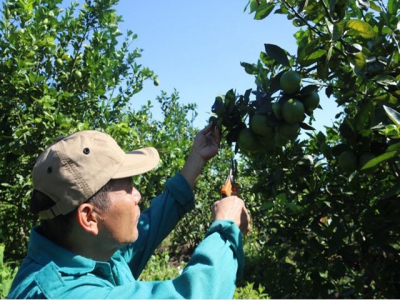Hà Tĩnh farmer turns wasteland into farm

HÀ TĨNH — Six years ago, Đoàn Văn Hà, 53, residing in Lưu Vĩnh Sơn Commune, Thạch Hà District took a risk and borrowed VNĐ1 billion (US$42,860) from his friends and a local bank to turn a wasteland filled with rocks into a livestock and fruit tree farm.
Đoàn Văn Hà harvests lemons at his farm in Lưu Vĩnh Sơn Commune, Thạch Hà District. —Photo dantri
Looking at his two-hectare farm, he recalled, “At that time, the whole area was overgrown and untouched. I sat and asked myself: 'Where do I start?'
“I was very fortunate to have the support of my wife and family”.
“At that time everyone said I was crazy. I had borrowed a large amount of money and would never pay it back, not to mention the risks in the process of production.
"Whatever they said, my wife and I had made up our minds, so we just kept quiet," said Hà.
Hà and his wife started carrying out the first jobs in the 10-year long-term plan to build a garden-farm model, including land improvement and pig cages.
When he first started setting up the farm, Hà decided to work with local businesses to minimise risks as well as get technical support.
He and his wife chose to invest in a large-scale pig breeding farm.
Despite careful preparation, he faced a setback when his first batch of dozens of pigs suddenly died in 2015.
Despite the failure, he was not discouraged and continued to visit successful farmers to learn their secrets.
The hard work paid off and the couple bred a herd of 400 pigs for meat that they sold.
From those first profits, he divided into three parts: one part to repay the bank debt, one part to continue breeding new pigs, and one part to plant orchards.
He thought he needed a variety of products so he could harvest year-round.
In 2016, his farm was expanded with 400 orange trees, 100 grapefruit trees, 150 lemon trees and 100 passionfruit trees.
“With the advantage of the area's topography with year-round water resources, I have dug an additional 2,500sq.m of ponds and lakes for fish breeding and tree watering in the dry season,” he said.
The fruit trees were always green and had quality fruits, so traders came to the garden to sign contracts several months in advance.
Currently, the farm maintains a herd of 400 pigs, one hectare of fruit trees (mainly oranges, grapefruit and lemons), and domestic animals with a high economic value like cows and chickens.
“After subtracting all costs, this model brings the family revenue of more than VNĐ300 million ($12,850) every year.”
He said happily the VNĐ1 billion loan had been paid off and his family had accumulated capital.
Not only bringing stable income to the family, but Hà’s farm also provides seasonal jobs for six or seven local labourers.
"In the season of weeding, pruning or fertilising, I hire them to work for one or two weeks for VNĐ2 million to VNĐ3 million/person per time," he said.
Nguyễn Thị Hoa, Chairwoman of the of Lưu Vĩnh Sơn Commune Farmers’ Association, praised it as the outstanding livestock-garden model, saying it has brought high economic efficiency since 2016.
The central province of Hà Tĩnh has seen successful farming-garden models spring up with numerous local farmers.
Chairman of Thạch Hà District Farmers’ Association, Dương Kim Hồng, said that it has advised local people on household economic development over the years.
Association members have built agricultural economic models applying VietGap standards advanced science and technology.
Local farmers set up specialised vegetable areas in the communes of Tượng Sơn, Thạch Văn, Thạch Liên, Bắc Sơn with an average profit of up to VNĐ200 million/ha, and improved hundreds of wasteland filled with rocks to gardens that bringing profit from to VNĐ100 million/ha per year.
The total number of farms owned by local residents in the district was reported to be 131.
Có thể bạn quan tâm
 Science and technology improves yield, revenues in northwest
Science and technology improves yield, revenues in northwest The cultivation of flowers, vegetables and fruit trees yields revenues of billions of dong in Son La Province due to the concerted application of science
 Vietnamese farming exports reach US$26.1 billion over the past eight months
Vietnamese farming exports reach US$26.1 billion over the past eight months Vietnam's farming exports in the first eight months of 2020 have been estimated at US$26.1 billion, down 0.9% over the same period of 2019.
 Vietnamese agro-forestry-fisheries trade surplus reached US$6.2 billion
Vietnamese agro-forestry-fisheries trade surplus reached US$6.2 billion Vietnamese's import-export turnover reached US$46 billion during the reviewed period, with export and import value dropping by 0.9% and 2.5%